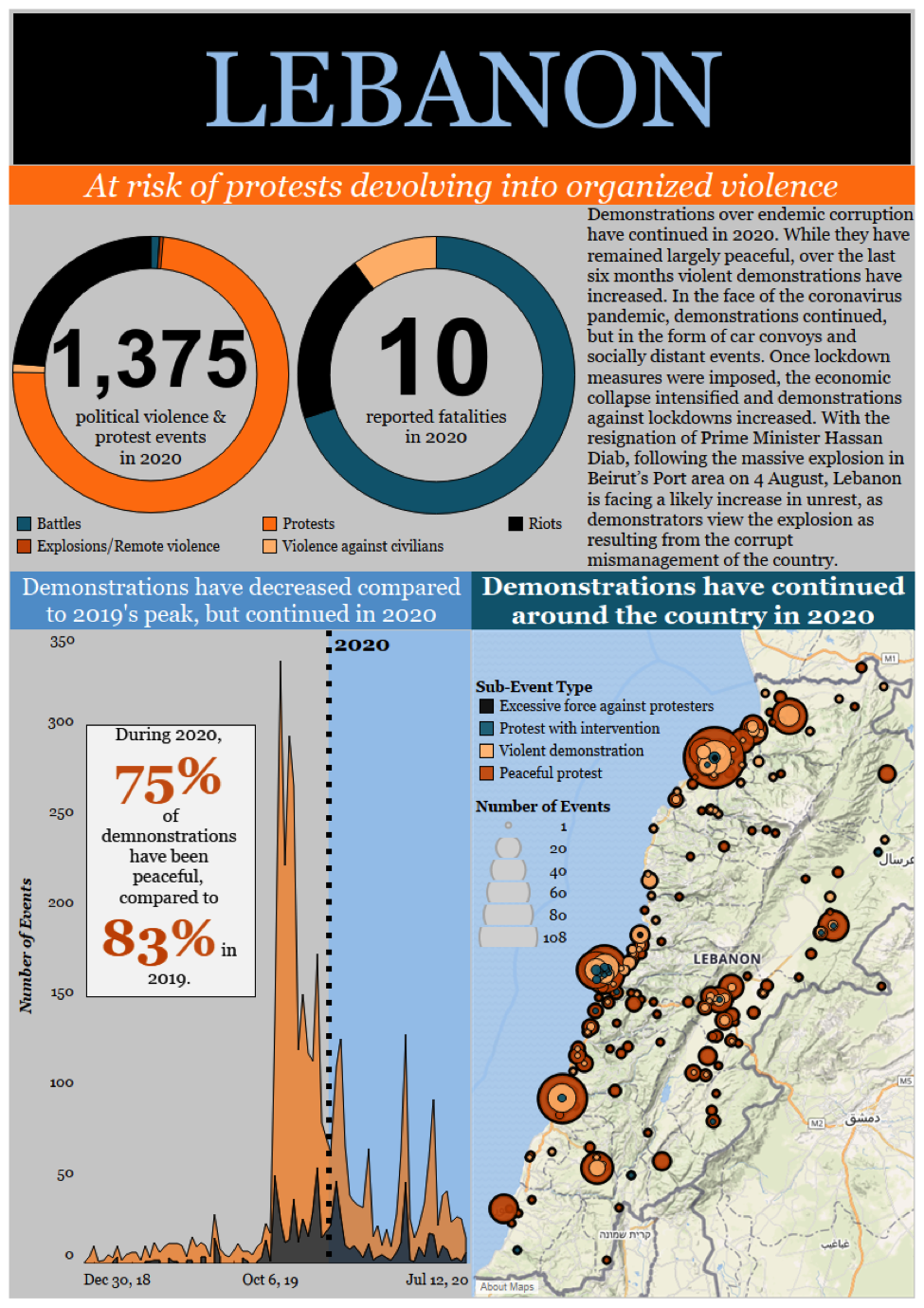LEBANON
While the coronavirus pandemic significantly impacted Lebanon’s existing political and economic crisis, the massive explosion which ripped through Beirut’s Port area on 4 August, reportedly caused by the faulty storage of ammonium nitrate, is expected to push the country even further towards economic collapse.
Prime Minister Hassan Diab, who has been leading the government since January 2020, resigned on 10 August, together with the entire government.
He noted that the explosion was a direct result of endemic corruption (Al Jazeera, 10 August 2020). Now, however, with no one in charge of the spiraling crisis, Lebanon is tasked with finding its third Prime Minister within the span of a year (CNN, 11 August 2020).

While demonstrations had remained largely peaceful, over the last six months, violent demonstrations and mob violence, especially following the explosion, have increased.
From the start of the nationwide demonstration movement in October 2019 to the end of 2019, roughly 19% of all demonstrations were accompanied by some form of violent rioting. This number has increased to approximately 33% from the beginning of 2020 through the end of July.
As frustrations have grown, bank branches have been bombed and burned down, and one protester was reportedly killed in Tripoli in May by live fire from Lebanese security forces (New York Times, 10 May 2020).
In the days immediately after the 4 August explosion, violent clashes ensued as demonstrators grew furious over the corruption, mismanagement, and negligence of the ruling elite that led to the disaster (New York Times, 8 August 2020).
The value of the Lebanese pound compared to the US dollar has crashed over the last year. It has lost approximately 75% of its original value since October (Al Jazeera, 23 June 2020). Inflation is increasing and the prices of food and basic needs have risen by approximately 55% (Financial Times, 15 June 2020).
In June 2020, the Prime Minister announced that they were seeking a $10 billion loan from the International Monetary Fund (IMF) to get the economy back on track (CNBC, 23 June 2020).
However, on 20 July, it was reported that talks with the IMF had halted (Washington Post, 20 July 2020).
Just before announcing the economic rescue plan involving the IMF, Lebanon was unable to make a $1.2 billion payment for foreign bonds for the first time since its establishment (New York Times, 10 May 2020).
As the coronavirus made its way to Lebanon, demonstrations continued, but in the form of car convoys and socially distant events. Once lockdown measures were imposed, the economic collapse intensified and demonstrations against lockdowns increased.
The impact of the coronavirus pandemic is estimated to raise poverty levels from 30% in 2019 to around 45% or more by the end of 2020 (EUROMESCO, June 2020).
Also fuelling frustrations is the ever-rising unemployment rate in Lebanon. By June 2020, the rate was above 30% and is only expected to continue to rise (Consultancy ME, 30 June 2020).
In recent months prior to the explosion, demonstrations shifted away from the initial calls for a new political system and toward concerns about resource shortages, particularly electricity.
Frustrations over the rationing of electricity ran high, as many areas only receive a few hours of electricity a day (Washington Post, 20 July 2020).
The explosion has only further exacerbated the issue as two of the main water and electricity stations were heavily damaged. The explosion compromised much of the capital city’s infrastructure, leaving 300,000 citizens without shelter (Al Jazeera, 5 August 2020).
It likewise almost entirely destroyed the port area which handles 80% of Lebanon’s imports and houses the country’s main grain silo (Time, 5 August 2020). At least four hospitals were damaged extensively in the blast and have had to turn away patients (Forbes, 5 August 2020).
A total of 20 people have so far been detained in relation to the 4 August blast, including the head of Lebanon’s customs department, his predecessor, and the head of Lebanon’s port (Global News, 10 August 2020).
Lebanon currently faces the worst financial crisis since the civil war, the coronavirus outbreak has spiked in recent weeks, and it is now confronted with the additional challenge of rebuilding the capital city, estimated to cost billions of dollars (Business Insider, 6 August 2020).
The effects of the seismic blast that rocked Beirut are expected to have a significant impact on Lebanon’s economy and may lead to a shortage of food within the next two months (Forbes, 5 August 2020).
While it is unclear how Lebanon will cope going forward, it is likely that the explosion, seen to have resulted from the same mismanagement and corruption that sparked the protest movement last year, will lead to even further unrest.
If you want to read the articles in order, click on PREVIOUS or NEXT PAGE
Or, Please click through the drop-down menu below to jump to specific cases.
MEXICO
YEMEN
INDIA
SOMALIA
IRAN
AFGHANISTAN
ETHIOPIA
LEBANON
UNITED STATES
ACLED / Balkantimes.press


